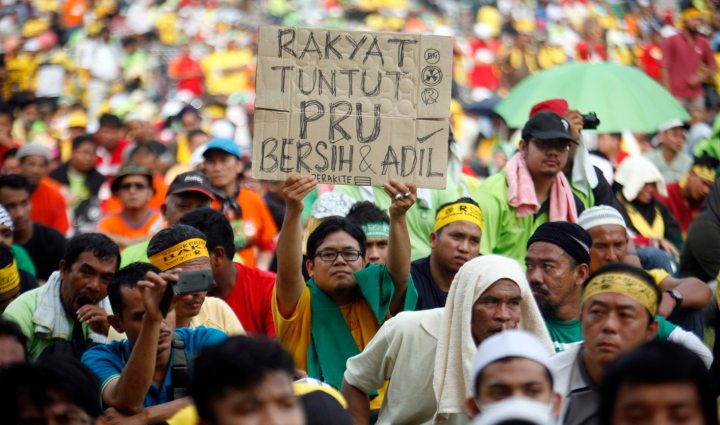Newsdeck
Run up to tense election puts Malaysia, investors on edge

Malaysian economist Azrul Azwar gave a presentation in Singapore last week that cost him his job. By Stuart Grudgings.
His analysis, outlining risks for investors from a narrow election victory for Malaysia’s opposition, was reported by a Malaysian online news site as a prediction the long-ruling Barisan Nasional (BN) coalition government would fall this year.
The response from his employer, government-linked Bank Islam, was swift. It suspended him on Monday and Azrul, who was its chief economist, told Reuters he would resign this week.
As Malaysia prepares for an election that Prime Minister Najib Razak must call by the end of April, the prospect of the biggest challenge to the coalition’s rule in 56 years is unnerving some government officials, emboldening the opposition and raising risks for investors.
“The BN leaders are so afraid. They put tremendous pressure on my boss,” Azrul told Reuters.
Bank Islam said in a statement that Azrul had been suspended because it had “reasonable grounds” to believe he had breached the bank’s internal policy.
A win for an opposition front led by former deputy prime minister Anwar Ibrahim would put Malaysia into uncharted political territory, placing economic policy in doubt and likely triggering a short-term plunge in financial markets.
Every government since independence in 1957 has been formed by the same alliance, led by the United Malays National Organisation (UMNO) in partnership with parties representing ethnic Chinese and Indian minorities.
That alliance, rebranded in 1973 as BN, was seen as formula to balance social and political interests of different ethnic groups, to maintain harmony in a country where Chinese dominate the business community.
The informal opposition front, the Pakatan Rakyat, has problems of its own, including divisions over religion and social policy between its ethnic Chinese and Islamist parties.
Few investors expect an opposition victory. The BN has deep pockets and an electoral system skewed in its favour. But the expectation, held by many investors, that the BN will score a solid parliamentary majority could prove foolhardy given the uncertainties.
Najib has delayed calling the polls to almost the last minute, suggesting he lacks confidence in bettering the coalition’s worst-ever election in 2008 despite a slew of government handouts to poorer voters over the past year.
The 2008 result triggered a 10-percent one-day plunge in the main Kuala Lumpur stock index as investors were swept up in what the opposition calls its “political tsunami.”
“I think the risks are not fully priced in,” said Vincent Khoo, head of research at brokerage UOB Kay Hian. “In the short term you will see potentially a sharp selloff.”
After driving the main Kuala Lumpur stock index up 11 percent last year, investors have begun taking some money off the table with an eye on the election. The main index is little changed from Nov. 1, compared with gains of around 9 percent in Thai stocks and 12 percent in the Philippines.
Foreigners withdrew $42 million from Malaysian offshore equity funds in the last six months of 2012, while adding a net $129 million and $230 million to Philippine and Thai funds respectively.
Kuala Lumpur emerged as a regional equities darling last year, hosting a string of high-profile initial public offerings that were bolstered by heavy state backing. Plans for IPOs this year, including power company Malakoff and port operator Westports Malaysia, have been pushed back due to political uncertainty, bankers say.
NOT PRICED IN?
Even if the opposition falls short of a majority, a poor result for the coalition would threaten Najib’s leadership, putting his reform programme in doubt.
Among crucial reforms that investors are expecting from Najib if he wins are a reduction in food and fuel subsidies that bloat the budget deficit and the introduction of a consumption tax to reduce Malaysia’s dependence on oil revenues. He is also closely associated with the $444 billion Economic Transformation Program that aims to lift Malaysia to developed status by 2020 through public and private investments.
Former prime minister Mahathir Mohamad, still an influential force in UMNO, told Reuters in a interview in late November that the minimum requirement for Najib was an improvement on the 140 parliament seats out 222 that the coalition won in 2008.
Anything less could prompt a revolt by UMNO conservatives, many of whom view Najib as a weak leader, due in part to his efforts to dismantle draconian security laws, loosen some media restrictions and appeal to younger voters.
“I think there will definitely be instability,” said Wan Saiful Wan Jan, head of the IDEAS thinktank in Kuala Lumpur, who expects Najib to win but with a smaller majority that would likely prompt a leadership challenge from within UMNO.
Most worrying for Najib is a haemorrhage of support from ethnic Chinese voters, who make up over a quarter of the multi-ethnic country’s population and have been alienated by corruption and policies favouring ethnic Malays.
Chinese voters deserted the BN in droves in 2008, raising concerns about racial polarisation in a country with a history of communal violence. The trend appears to have intensified as they increasingly see the opposition as a viable alternative.
NOT A “WILD, CRAZY DREAM”
A national poll released last week by the respected Merdeka Center found that 52 percent of Malaysians thought the country was heading in the right direction, down from 58 percent last April. Just 16 percent of Chinese respondents agreed things were going well, despite robust economic growth of around 5 percent last year, plunging from 41 percent last February.
Support from majority ethnic Malays, UMNO’s bedrock, remained high at 70 percent, as did backing from ethnic Indians who make up about 15 percent of the country’s 28 million people.
The opposition’s confidence was on display on Saturday when up to 100,000 supporters rallied at Kuala Lumpur’s Merdeka stadium, where the country declared independence in 1957. Police and state-controlled media tallied the crowd at just 45,000.
Khoo said that despite the uncertain outcome, few investors were entertaining thoughts of an opposition victory.
“At the end of the day, money talks, and there’s been a lot of money poured into this election,” said Khoo, referring to government handouts that have included cash for poor families, bonuses for civil servants and new tyres for taxi drivers.
But Azrul, the former Bank Islam economist, said in his Singapore presentation that a narrow opposition win was the most probable scenario based on a surge in new, younger voters, the collapse in Chinese support and the trend in recent local elections. He gave a lower probability to two other scenarios – a narrow BN win and a big opposition victory.
“It’s not a wild, crazy dream,” Azrul said of an opposition victory. “It’s highly possible.”
The opposition would not necessarily need to win an outright majority to take power. A slim win by a few seats for the ruling coalition could trigger intense horse-trading as Anwar seeks to persuade coalition members to jump ship.
An opposition win would likely set off short-term market turmoil on uncertainty over its ability to take over the reins of government smoothly and overcome institutional resistance from the UMNO-dominated civil service.
“The top layer of the civil service is already entrenched with UMNO culture,” said Wan Saiful of the IDEAS institute. “It will be chaotic if change happens.” DM
Photo: A man holds a placard that reads “People demand clean and fair elections” at the Stadium Merdeka during the opposition People’s Uprising Rally in Kuala Lumpur January 12, 2013. Speculation has been swirling over the timing of what is expected to be a fiercely fought election, which Malaysia’s Prime Minister Najib Razak must call in just three months. Local media reported that about 80,000 people attended the rally. REUTERS/Samsul Said




















 Become an Insider
Become an Insider